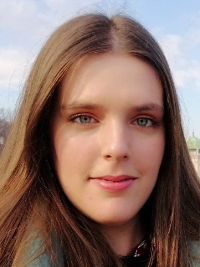Mariana Neves São Pedro received her Bachelor’s Degree in Biochemistry from Faculdade de Ciências da Universidade de Lisboa (FCUL), followed by her Master’s Degree in Biotechnology from Instituto Superior Técnico (IST). Her thesis, titled “Minimizing the influence of fluorescent tags on protein partition in aqueous two-phase systems for rapid screening applications”, under the orientation of Professor Dr. Raquel Aires-Barros and Dr. Ruben Soares, was published in Biotechnology Journal (doi: 10.1002/biot.201800640). After graduation, she continued her work in Professor Dr. Raquel Aires-Barros’ group, performing microfluidic studies of different chromatographic conditions and resins for the purification of antibodies fragments. Recently she joined the CODOBIO network and has been awarded a Marie Skolodowska-Curie actions PhD fellowship at Technische Universiteit Delft (TU Delft) under the supervision of Professor Dr. Marcel Ottens and Professor Dr. Michel Eppink.
Research Focus:
Development of a biosensing microfluidic chip prototype for fast in line process analytical technology (PAT) for the detection of high molecular weight (HMW) species during a continuous downstream process of monoclonal antibodies.
Short description of project:
Development of a biosensor microfluidic chip for fast at-line process analytical technology (PAT) for the detection of aggregates during a continuous downstream process for the manufacturing of monoclonal antibodies.
What new skill/skills did you learn?
During this PhD project, I was lucky to have at my disposal new equipment and several techniques, such as a liquid handling system or an advanced chromatography workstation. Therefore, I had the opportunity to learn and further explore my knowledge in those techniques. Additionally, I have gained soft skills with this PhD project, ranging from time management, communication and presentation skills and project management, by amongst others supervising two Master projects.
What did you enjoy most about your project?
The collaboration with other research groups and the close contact with the industry partners, which allowed for a better understanding of the real needs for implementing continuous biomanufacturing.
What do you believe is your biggest contribution to the scientific community?
The proof of concept that the miniaturization of the analytical technique is a powerful solution to speed up the measurement.
What would your advice be for future Early-Stage Researchers at the start of their project?
To just be patient and flexible, that the initial planning for the project will change and it is not worth it to stress about it.
What do you plan next?
I plan to make the shift from academia to industry, applying the knowledge of continuous biomanufacturing I have gained in the last four years.



